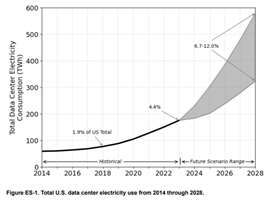Report: U.S. eyes data centers, energy sources
April 14, 2025
Department of Energy identifies 16 possible sites
The U.S. government has identified 16 federal sites where data centers and energy generation projects could be co-located, aiming to accelerate artificial intelligence (AI) infrastructure and boost domestic energy production. The Department of Energy (DOE) announced the initiative earlier this month, with plans to form public-private partnerships and begin operations by the end of 2027, according to Reuters Events.
As data centers drive soaring electricity demand — forecast to more than double in the U.S. from 176 terawatt-hours (TWh) in 2023 to up to 580 TWh in 2028 — the government is rethinking its energy priorities. While renewable energy continues to grow, the Trump administration has signaled a firm commitment to natural gas and nuclear power as central to its strategy for powering this surge.
In a recent policy address, U.S. Energy Secretary Chris Wright said, “There is simply no physical way that wind, solar, and batteries could replace the myriad uses of natural gas.”

The DOE noted that while some of the proposed co-location sites could use nuclear energy from existing reactors and future small modular reactors (SMRs), natural gas is expected to play a leading role in meeting the rising energy demands of AI and data infrastructure.
According to the U.S. Energy Information Administration (EIA), natural gas accounted for 42% of the U.S. generation mix in 2024, but is forecast to dip slightly to 40% in 2026 as renewables rise. Despite that, Energy Secretary Wright emphasized that natural gas remains indispensable to national energy security and economic competitiveness.
Meanwhile, the administration plans to fast-track permitting for new energy projects, including natural gas and nuclear, though further details have yet to be released.
Reuters Events also reported on rising uncertainties in the U.S. battery storage sector, with analysts warning that potential policy shifts and new tariffs under the Trump administration could affect clean energy deployment timelines.
MAGAZINE
NEWSLETTER

CONNECT WITH THE TEAM







